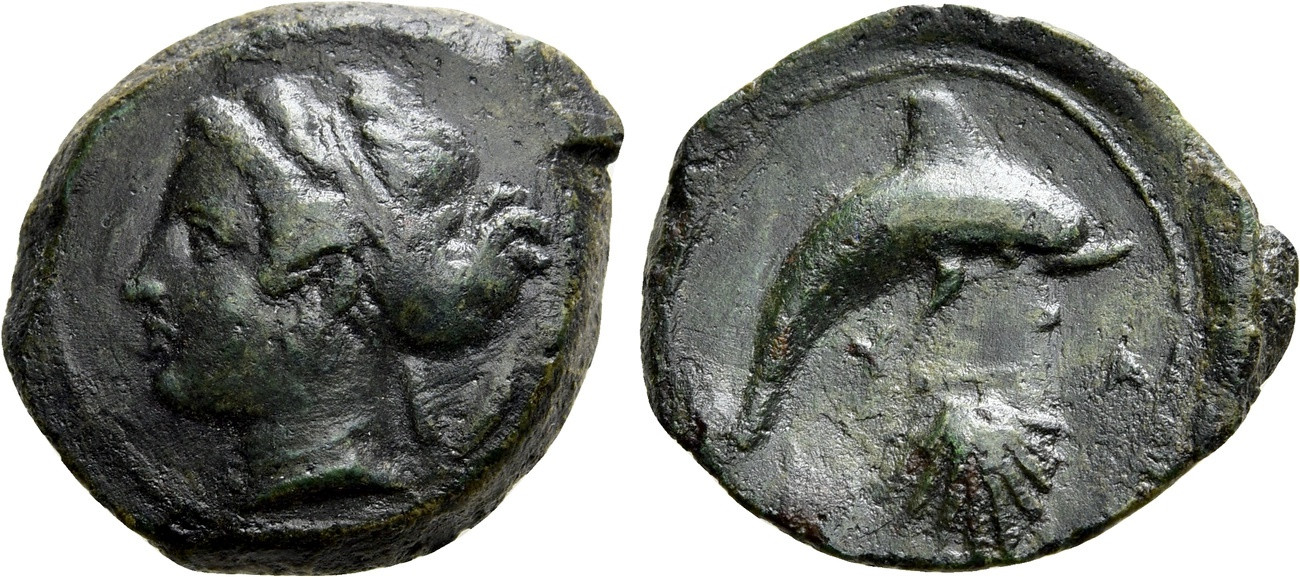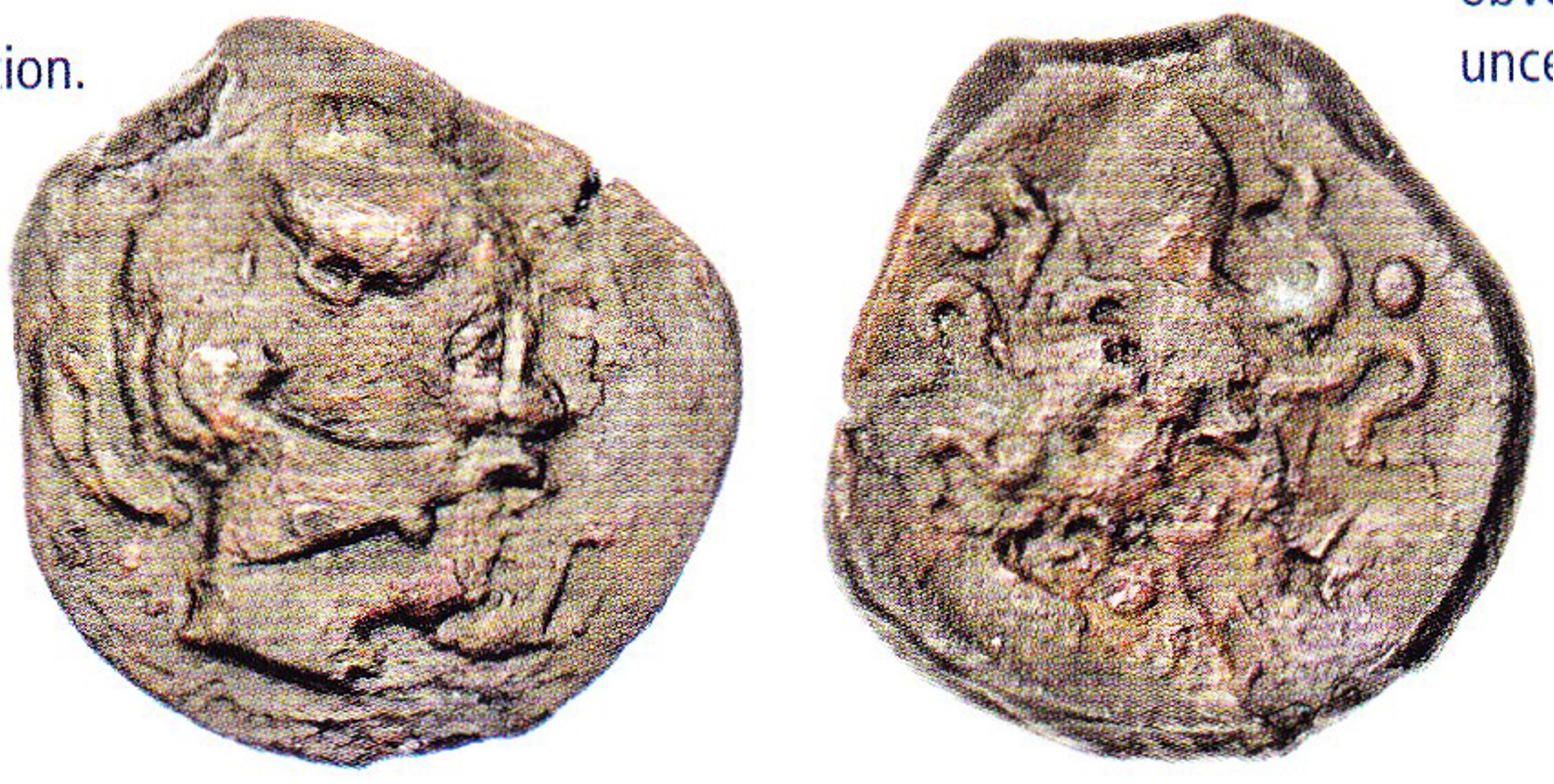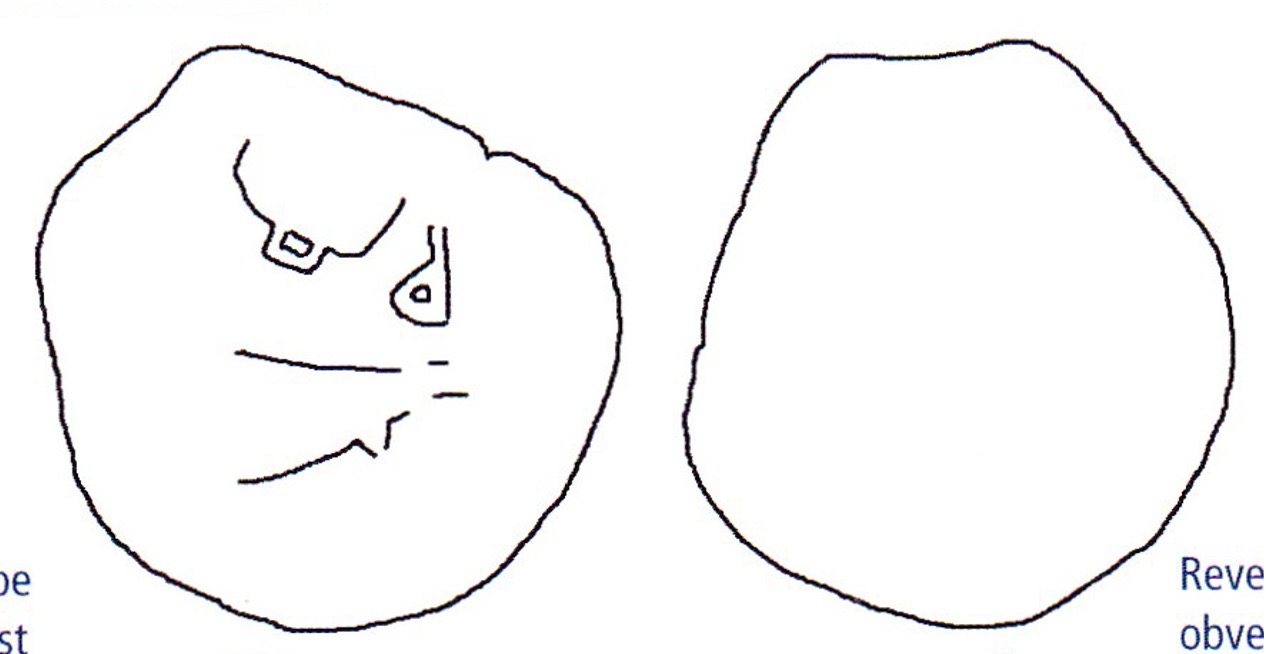2719 - Syracuse (AE Arethusa/octopus) over Syracuse (Arethusa/dolphin) (MacDonald coll., 38)
From SILVER
435 BCE - 415 BCEΣΥΡΑ
Images
Overstruck variety Traces of the overstruck variety
Traces of the overstruck variety

Syracuse_Arethusa-dolphin_.jpeg [1]
Location/history
| Private collection(s)Private collection(s) ᵖ: | David MacDonald collection, n° 38 |
Overstriking coin
Description
| ObverseInscription or printing placed on the obverse.: | ΣΥΡΑ (Greek) Head of Arethusa right. In right and left fields, dolphins. | ReverseInscription or printing placed on the reverse.: | Octopus and 3 pellets (mark of value). |
Mint and issuing power
| MintIdentifies the place of manufacture or issue of a numismatic object.: | Syracuse | Ancient regionAncient region. | Sicily | Modern countryModern country: Italy | AuthorityIdentifies the issuing power. The authority can be "pretended" when the name or the portrait of X is on the coin but he/she was not the issuing power. It can also be "uncertain" when there is no mention of X on the coin but he/she was the issuing power according to the historical sources: |
Chronology
| FromIdentifies the initial date in a range assigned in a numismatic context. 435 BCE toIdentifies the final date in a range assigned in a numismatic context.. 415 BCE | Classical 480-323 BC |
Physical description
| MetalThe physical material (usually metal) from which an object is made.: Bronze |
WeightWeight of the numismatic object (in grams). in grams: 2.842.84 g <br />2,840 mg <br /> | DenominationTerm indicating the value of a numismatic object. Examples: tetradrachm, chalkous, denarius.: tetras | AxisDescribes the directional relationship between the obverse and reverse of a numismatic object.: 11 mm <br />0.1 cm <br /> |
| DiameterDescribes diameter of an object (in mm).: 1818 mm <br />1.8 cm <br /> | StandardStandard.: Litra | ||
References
| Coin referenceReference of the Coin: | MacDonald 2009, p. 51, n° 38 | Coin series referenceReference to coin series study: | Calciati 19861Calciati 1986, n° 1-8, SNG ANS 5 Sicily2SNG ANS 5 Sicily, n° 376-81, HGC 23HGC 2, n° 1428, Puglisi 20094Puglisi 2009, p. 321, n° 295 |
| Coin series web referenceCoin series web references: | |||
Overstruck type
Description
| ObverseInscription or printing placed on the obverse.: | Arethusa left. Behind, sprig of laurel (visible on reverse: no certain traces). | ReverseInscription or printing placed on the reverse.: | ΣΥΡΑ (Greek) Dolphin and scallop shell (visible on obverse: most of body of dolphin and scallop shell, P). |
Mint and issuing power
| MintIdentifies the place of manufacture or issue of a numismatic object. ᵖ: | Syracuse | Ancient regionAncient region. ᵖ | Sicily | Modern countryModern country: Italy | AuthorityIdentifies the authority in whose name (explicitly or implicitly) a numismatic object was issued. ᵖ: |
Chronology
| FromIdentifies the initial date in a range assigned in a numismatic context. 415 BCE toIdentifies the final date in a range assigned in a numismatic context.. 405 BCE | Classical 480-323 BC |
Physical description
| DenominationTerm indicating the value of a numismatic object. Examples: tetradrachm, chalkous, denarius. ᵖ: | denomination C |
References
| Coin type referenceReference to coin series study ᵖ: | Calciati 19861Calciati 1986, n° 24, SNG ANS 5 Sicily2SNG ANS 5 Sicily, n° 415-425, HGC 23HGC 2, n° 1480, Puglisi 20094Puglisi 2009, p. 322, n° 300 | ||
| Coin series web reference overstruckCoin series web references overstruck: | |||
Additional data
| Frequency of overstrikesFrequency of overstrikes: | rare and spread | Level of confidenceLevel of confidence of the identification: | sure |
| RemarksRemarks: | nb: chronological problem | ||
References
- a b Calciati, Romolo (1986), Corpus nummorum siculorum. La monetazione di bronzo/The bronze coinage, vol. 2, Milan, Edizioni G. M.
- a b Sylloge Nummorum Graecorum ANS 5. The Collection of the American Numismatic Society. Sicily 3. Syracuse-Siceliotes, New York, 1988,
- a b Hoover, Oliver D. (2012), The Handbook of Greek Coinage Series. 2. Handbook of the Coins of Sicily (Including Lipara). Civic, Royal, Siculo-Punic, and Romano-Sicilian Issues. Sixth to First Centuries BC, Lancaster-London, 489 p.
- a b Puglisi, Mariangela (2009), La Sicilia da Dionisio I a Sesto Pompeo : circolazione e funzione della moneta, Messina, DiScAM, p. 519.

